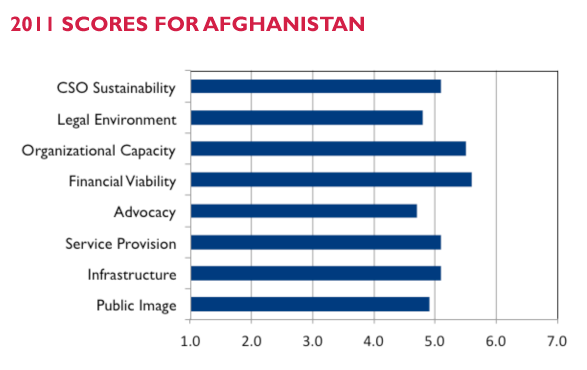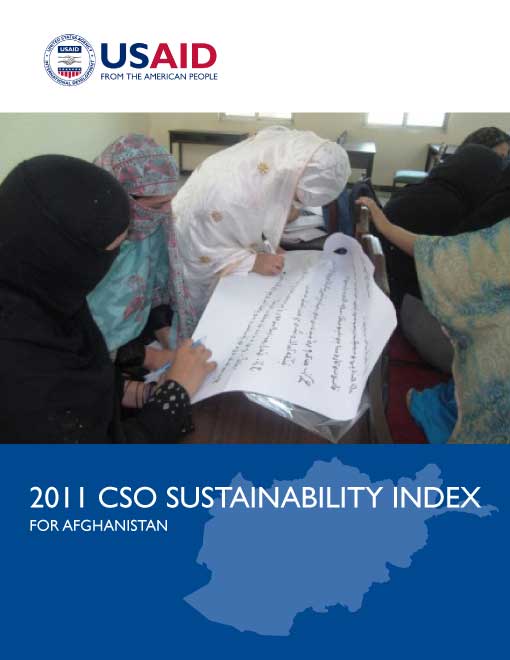- What We Do
- Agriculture and Food Security
- Democracy, Human Rights and Governance
- Democracy, Human Rights and Governance Strategy
- Supporting Free and Fair Elections
- Supporting Vibrant Civil Society & Independent Media
- Protecting Human Rights
- Promoting Accountability & Transparency
- Importance of Democracy, Human Rights, & Governance to Development
- Countering Trafficking in Persons
- Economic Growth and Trade
- Education
- Ending Extreme Poverty
- Environment and Global Climate Change
- Gender Equality and Women's Empowerment
- Global Health
- Water and Sanitation
- Working in Crises and Conflict
- U.S. Global Development Lab
BACKGROUND
The 2011 CSO Sustainability Index for Afghanistan reports on the sustainability of the civil society sector in Afghanistan based on the assessment of local civil society representatives and experts. The CSO Sustainability Index is an important and unique tool for local civil society organizations (CSOs), governments, donors, academics, and others to understand and measure the sustainability of the CSO sector. This publication complements other editions of the Sustainability Index which cover sixty countries in Central and Eastern Europe and Eurasia, Sub-Saharan Africa, the Middle East and North Africa, and Pakistan.
APPROACH
The Index analyzes and assigns scores to seven interrelated dimensions of CSO sustainability: Legal Environment, Organizational Capacity, Financial Viability, Advocacy, Service Provision, Infrastructure, and Public Image. These scores are averaged to produce an overall score. Details of the methodology can be found at http://www.usaid.gov/sites/default/files/documents/1866/annexa-cso-susta....
FINDINGS

The overall score for CSO sustainability in Afghanistan is 5.1. CSOs in Afghanistan operate in a challenging environment. As the Index reports, civil society nevertheless plays a nascent role in the country’s democratic process. The legal environment for CSOs has improved significantly since 2002, and according to official figures, there are now 3,022 NGOs and 1,707 SOs registered with the government. CSOs across the country provide services in the fields of agriculture, health, education, and some small-scale construction services. In urban areas, CSOs also work in the areas of capacity building, good governance, empowerment, and civic education. Jirgas and shuras provide decision-making and conflict resolution services in the community. CSO organizational challenges including planning, constituency building, diversification of funding, developing clear internal management systems, and attracting adequate qualified staff, although CSOs have growing access to training and resource centers. Organizational capacity tends to be stronger in Kabul and other main cities than in smaller cities and rural areas as a result of the concentration of donor funding and qualified human resources. Both civil society and government need to develop the capacity to engage each other. One positive example of growing engagement between CSOs and central government institutions is the increasing role civil society is playing in oversight by parliament, particularly with respect to budget matters. In an example from the local level, a children’s rights organization works with the local government in one province on educational rights and the fight against violence against children. CSOs also regularly establish coalitions that engage in joint lobbying efforts on major issues and laws, such as the law for elimination of violence against women, the family law, and the law on access to information. Public perception of the sector is positive, although CSOs can do more to promote public understanding of the role of civil society.








Comment
Make a general inquiry or suggest an improvement.